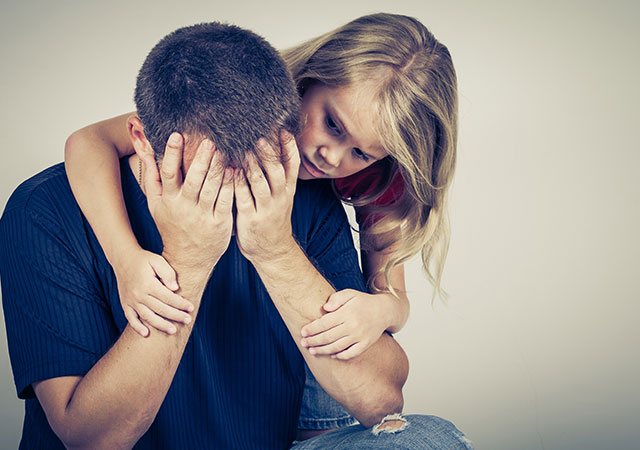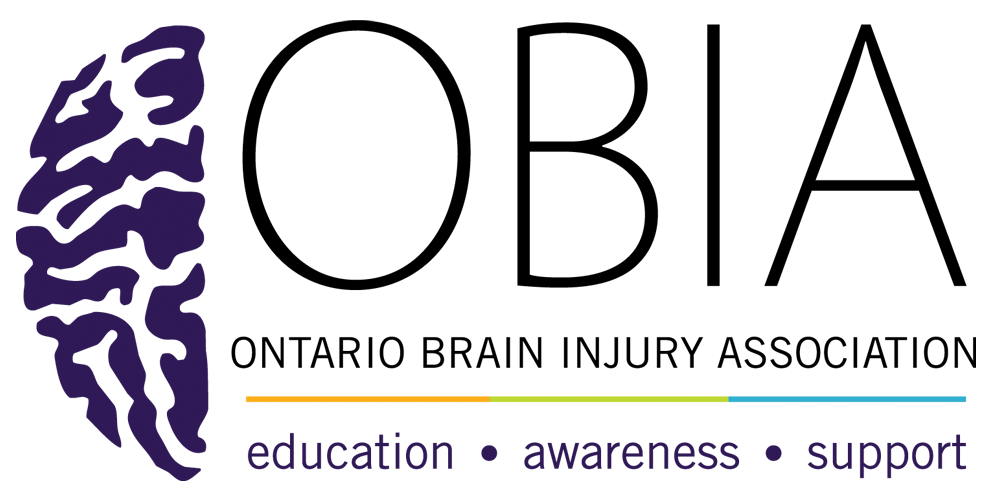Relationships
Relationships provide us with a sense of well-being and security in our lives and contribute to our sense of self-identity. The impact of a brain injury on relationships is like a boulder being thrown into a lake, the ripples radiate out affecting many individuals in the person’s social network such as partners, family, friends, colleagues, and the larger community. This may cause distress for the person with a brain injury and the people supporting them.
Families
Family life can also change significantly following a brain injury. These changes may be short-term or can last for years. The family system may be impacted by disruption of family roles, shifting responsibilities, safety issues, family strain, financial pressure, social isolation, and ongoing caregiving.
Relationships
Relationships provide us with a sense of well-being and security in our lives and contribute to our sense of self-identity. The impact of a brain injury on relationships is like a boulder being thrown into a lake, the ripples radiate out affecting many individuals in the person’s social network such as partners, family, friends, colleagues, and the larger community. This may cause distress for the person with a brain injury and the people supporting them.
Families
Family life can also change significantly following a brain injury. These changes may be short-term or can last for years. The family system may be impacted by disruption of family roles, shifting responsibilities, safety issues, family strain, financial pressure, social isolation, and ongoing caregiving.
Relationship Types
Couples
There may be drastic changes to many parts of your relationship that are very personal and emotional for both yourself and your loved one.
Adult Children
When an adult loses their ability to function independently, or they experience personality and behaviour changes after a brain injury, parents may be called upon to step in as a caregiver.
Family Adjustment
Family adjustment refers to how a family responds and adapts after a major life stressor such as a brain injury. When a brain injury occurs, it impacts the entire family not only the individual who sustained the injury.
Siblings
Siblings can find it difficult to deal with an injury to their brother or sister and may not be able to understand the injury and how devastating it may be to the entire family.
Family Grieving
Every family experiences feelings of grief, guilt, despair, anger, and frustration. These are normal reactions to an extraordinary loss.
The Change Recognition Questionnaire
You and other family members are encouraged to complete this questionnaire and take the time to discuss the responses. You may use this questionnaire at different points in time.
Couples
There may be drastic changes to many parts of your relationship that are very personal and emotional for both yourself and your loved one. Sometimes, behaviour changes in the individual with a brain injury can make it feel as though you are with a stranger. Following brain injury, there may be changes in roles and responsibilities between couples that can increase stress and tension between partners.
Listen to Nancy as she talks about the emotional roller-coaster she felt following her husband Sean’s brain injury.
Couples
There may be drastic changes to many parts of your relationship that are very personal and emotional for both yourself and your loved one. Sometimes, behaviour changes in the individual with a brain injury can make it feel as though you are with a stranger. Following brain injury, there may be changes in roles and responsibilities between couples that can increase stress and tension between partners.
Listen to Nancy as she talks about the emotional roller-coaster she felt following her husband Sean’s brain injury.

A change in partner roles following brain injury can make the adjustment period very challenging. During this transition period, couples may experience increased frustration, uncertainty, and criticism as partners begin to adapt to their new roles in the relationship.
Feelings of loneliness and isolation may result from changes in communication between partners. Sometimes, couples feel they do not understand what the other person is thinking or feeling. As a result, partners may begin to distance themselves from the relationship and choose to express their feelings with others. Ongoing difficulties with communication can make the transition period following a brain injury more challenging and may result in deterioration of the couple’s relationship.
Additionally, there may be changes to a couple’s physical intimacy following a brain injury. These may be a result of changes in hormone levels, roles in the sexual relationship, appearance and confidence in oneself, and areas of sexual interest.
The following are strategies to manage these changes in a relationship with your partner
Recognize Change
Understand the new responsibilities
and talk about the challenges related to these new roles.
Communicate
Openly communicate about
the changes in your roles.
Be Thankful
Thank your partner for attempting to manage new responsibilities and ask them for their feedback about tasks they did prior to their injury.
Take Breaks
Take breaks from your responsibilities and ask for help from your friends and family to support you through these changes.
listen
Listen to your partner with patience and care, and think carefully before responding to disagreements.
OFFER time
Provide your loved one with more time to think about what is being said and to answer questions.
Write Down Points
Sometimes it can be difficult to remember all our concerns during a difficult conversation. Write down points prior to a big discussion and share these points with your loved one.
Find Help
Access a psychotherapist or social worker for individual or couple’s counselling.
ACCESS Support Groups
Find a support group with individuals who have been through similar experiences to help you manage the changes in your relationship.
Adult Child Relationships
When an adult loses their ability to function independently, or they experience personality and behaviour changes after a brain injury, parents may be called upon to step in as a caregiver. A range of emotions such as anger, guilt, grief, and loneliness are often experienced by parents as they have to adjust their routines and future plans in order to provide care for their child as an adult.

Also, additional responsibilities may be involved such as: assisting with activities of daily living, personal care, caring for grandchildren or acting as a support (physically, emotionally or financially) for your child as they navigate the changes following a brain injury.
The increased stress related to managing care for a loved one and balancing the needs of all family members can be extremely challenging and may result in changes to work, vacation, and social activities.
The following are strategies to manage these changes in a relationship with your adult child
Be involved
Your child’s rehabilitation can help you better understand their injury and how best to support them during their recovery.
ACCEPT help
Identify areas where you need help and accept assistance when it is offered.
keep daily Routines
Keep daily routines as normal as possible.
access Support Groups
Access support groups with other caregivers and counselling.
build Strong Networks
Develop and maintain a strong network of friends and participate in recreation to avoid become isolated and lonely.
encourage Independence
Encourage your child to become as independent as possible by supporting them learning new skills. Look for day programs to enroll them in to support their independence and provide yourself some respite.
Family Adjustment
Family adjustment refers to how a family responds and adapts after a major life stressor such as a brain injury. When a brain injury occurs, it impacts the entire family not only the individual who sustained the injury. The injury often leads to fear and an uncertainty for the future.
Listen to Ivars as he talks about the changes in family roles and responsibilities following his wife Jenn’s brain injury.
Sudden changes to a loved one’s personality, mood, and behaviour can be more difficult to understand and manage than physical changes. They are often confusing for loved ones, and family members may miss the person they were prior to the injury. With a change in personality and behaviour, it is normal for family members to need time to get to know them and become comfortable with the changes.
Role changes following a brain injury may happen in different ways (i.e. if a parent is injured, a child may take over more responsibilities than if a sibling were injured). The increased stress related to managing care for a loved one and balancing the needs of all family members can be extremely challenging and may result in changes to work, vacation, and social activities.
Listen to Ivars as he talks about the changes in family roles and responsibilities following his wife Jenn’s brain injury.
Sudden changes to a loved one’s personality, mood, and behaviour can be more difficult to understand and manage than physical changes. They are often confusing for loved ones, and family members may miss the person they were prior to the injury. With a change in personality and behaviour, it is normal for family members to need time to get to know them and become comfortable with the changes.
Role changes following a brain injury may happen in different ways (i.e. if a parent is injured, a child may take over more responsibilities than if a sibling were injured). The increased stress related to managing care for a loved one and balancing the needs of all family members can be extremely challenging and may result in changes to work, vacation, and social activities.
The following are strategies to help your family adjust following a brain injury
SELF CARE
Take care of yourself and your family, eat well, exercise and sleep.
BE INVOLVED
Continue to engage in and participate in work and social activities.
COMMUNICATE
Communicate about the change in family roles and responsibilities.
Delegate Tasks
Be comfortable delegating tasks
to different family members to
help complete household tasks.
ACCEPT HELP
Accept help from family and friends.
Seek Counselling
Seek individual or family counselling to deal with grief and loss, learn problem solving skills and develop stress management strategies.
THINK BRAIN FIRST
Think Brain First. Remember most behaviour problems are due to the brain injury.
Educate Yourself
Learn as much as possible about your loved one’s brain injury through education and support groups where available.
Participate
Spend time participating in activities with your loved one that you used to enjoy doing together before the injury.
Siblings
Siblings can find it difficult to deal with an injury to their brother or sister and may not be able to understand how devastating it may be to the entire family. Each child is affected differently, but siblings can be one of the most important supports for your child following their brain injury.
At the time of the injury, siblings are often shuttled from place to place to make sure they are cared for while their brother or sister is in the hospital and in recovery. Although siblings may understand the importance for their parents to be with their sibling, they still have their own needs. They may experience intense emotions of sadness, worry, anxiety, anger, jealousy, loneliness, and guilt.
Listen to Joanne as she speaks about how her other children managed following her son Jeff’s brain injury.
Depending upon the behaviours and needs of their brother or sister, siblings may be embarrassed to invite friends to their house and become isolated from their peer groups. This isolation may be increased if they are not able to participate in activities and hobbies they did previously because of the cost and care needed to support their sibling.
Common questions that surface in the minds of siblings following a brain injury are:
- Will they live?
- If they live, will they be the same?
- What does it mean to have a brain injury?
- How long is all this going to go on?
- Why are my parents so stressed?
Listen to Joanne as she speaks about how her other children managed following her son Jeff’s brain injury.
Depending upon the behaviours and needs of their brother or sister, siblings may be embarrassed to invite friends to their house and become isolated from their peer groups. This isolation may be increased if they are not able to participate in activities and hobbies they did previously because of the cost and care needed to support their sibling.
Common questions that surface in the minds of siblings following a brain injury are:
- Will they live?
- If they live, will they be the same?
- What does it mean to have a brain injury?
- How long is all this going to go on?
- Why are my parents so stressed?
The following are strategies to support siblings manage the changes following a brain injury in their brother or sister.
BE HONEST
Be honest and keep them informed about what is happening with their sibling. Answer the questions they ask to the best of your ability.
Explain Rehabilitation
Explain rehabilitation and help them to understand that their sibling may get better with time.
LISTEN
Allow them the opportunity to express their feelings, fears, and needs with you.
Seek Counselling
Access counselling for your child and your family to help them learn strategies to manage their emotions and express themselves.
Spend Time
Set aside time each day to spend with them one-on-one.
Limit Caring for their Sibling
Limit the type and amount of care and support the sibling will do for their brother or sister.
SCHOOL INVOLVEMENT
Keep the school informed about what is happening and ask them to support your child.
FAMILY ROLES
Explain new roles and responsibilities they may have within the family and support them as they take on these roles.
Monitor Health and Well-being
Monitor their health, well-being, and education (i.e. disturbed sleep, not being able to do homework, complaining of sickness more often).
The following article provides information about siblings and peers after a brain injury:
Family Grieving: How to Mourn Resiliently
(Used with expressed permission from Holland Bloorview Kids Rehabilitation Hospital. Adapted for BIFI-A by Caron Gan)
Every family experiences feelings of grief, guilt, despair, anger, and frustration. These are normal reactions to an extraordinary loss. Physically, your loved one is still present, but emotionally it may feel like you have lost the person you once knew. This is often referred to as ambiguous loss.

Ambiguous loss can be the most stressful of losses because individuals, partners, and families become frozen in grief. Often this is because there are no associated mourning rituals to acknowledge the loss such as obituaries and funerals. This can contribute to depression, anxiety, hopelessness, and conflict that can erode couple and family relationships.
Some of the following are strategies to cope with ambiguity of loss:
TEACH OTHERS (recognize some will not understand..)
Recognize that some people will not understand the impact of brain injury and what you are going through.
RECOGNIZE DIFFERENCES
(in coping)
Recognize that family members cope in different ways. You may not go through the same stages of grief at the same time.
SHARE YOUR FEELINGS
Share your feelings. Seek out family members, friends, and brain injury support groups where you can share your emotions. Connect with other caregivers to individuals with a brain injury.
EDUCATE YOURSELF
Become educated about brain injury and the available supports in your area.
Take Breaks
Make a date with your friends or family members or go on holiday where talk about the injury are suspended. Try to build in fun and normal activities to your daily life.
KEEP HOLIDAYS AND TRADITIONS
Recognize that grief can recur during milestones and changes in life. Continue but revise family holidays, celebrations, and rituals.
REVISE FAMILY ROLES
Revise family roles to manage the stress that comes with caring for someone with cognitive challenges.
Create a New Normal
Focus on building a ‘new normal’ as opposed to wishing you could turn back the clock. Find something new to hope for.
Below are downloadable versions of the above information:

